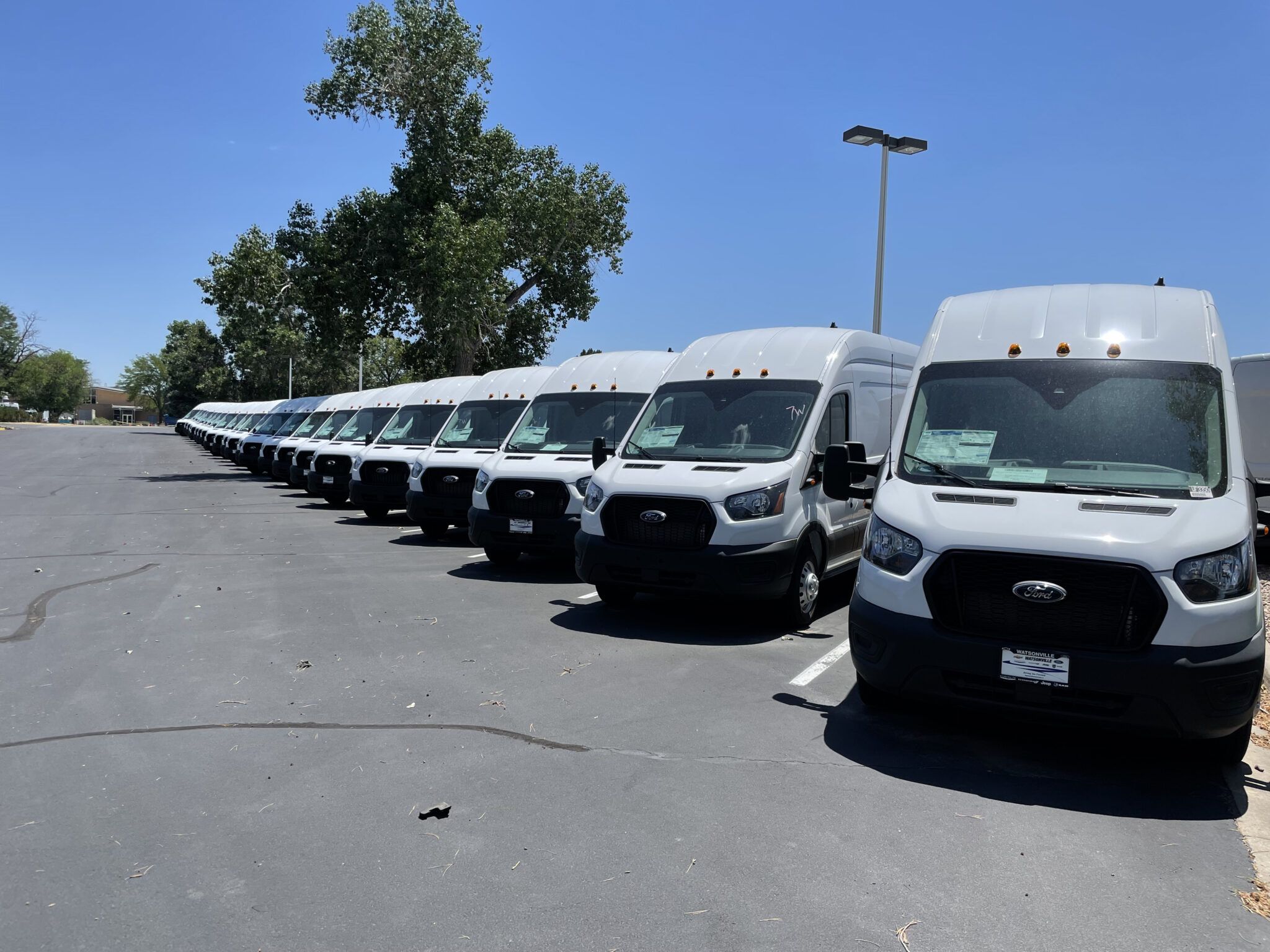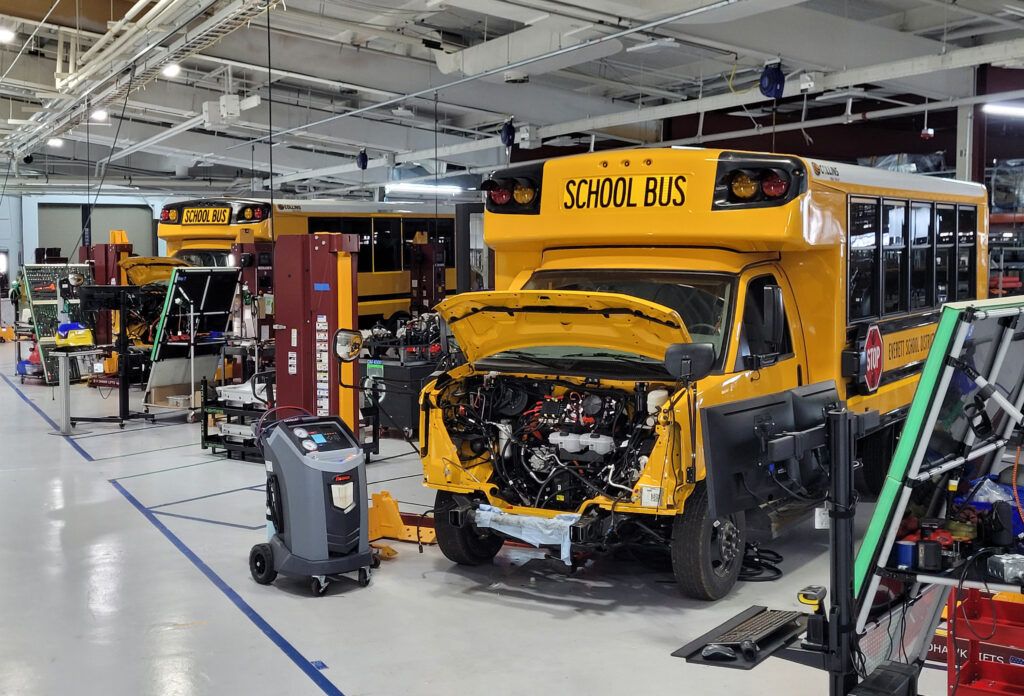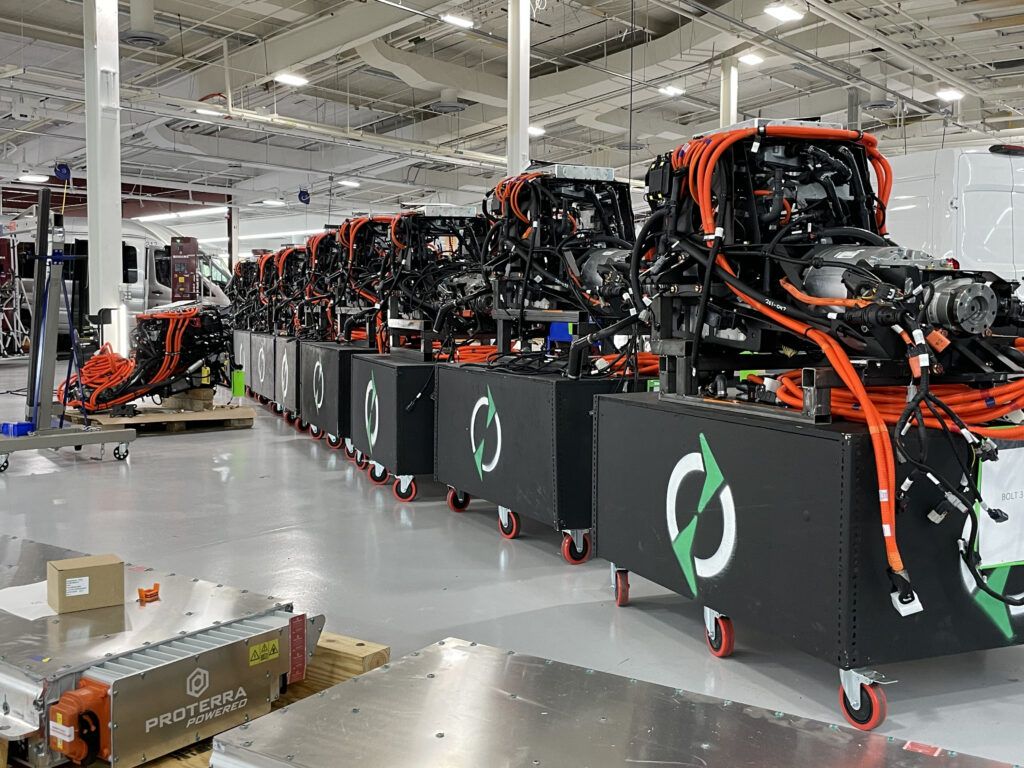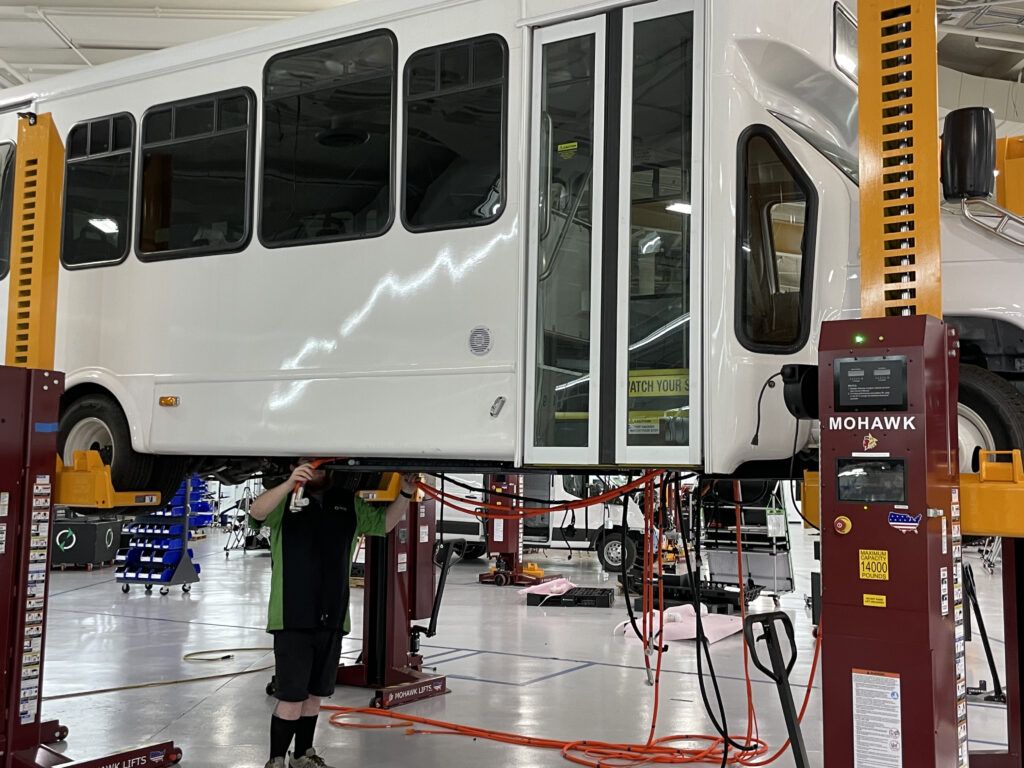Lightning storm
Electric-vehicle company grew fast, collapsed faster

LOVELAND— “The opportunities at Lightning eMotors have never been greater,” the Loveland-based company’s CEO told shareholders last year.
Today, however, the ambitious Loveland-based startup that designs and builds electric vehicles for commercial and government fleets has reached the end of its road.
Its 15-year journey was marked by rapid growth, pioneering innovations, major contracts, global acclaim and emergence into public trading using an alternative business tactic. In the final miles, however, its underpinnings were damaged by supply-chain challenges, the failure of a pair of battery makers, massive losses and a bevy of lawsuits that all led to the collapse of its share prices and delisting by the New York Stock Exchange.
SPONSORED CONTENT
22nd Annual Vintage Affair: A Community Gathering to Support Pathways
The 22nd Annual A Vintage Affair event, presented by Wilbur’s Total Beverage, benefits Pathways’ mission of providing expert medical and comfort care for individuals navigating the last months of life.
Finally, slightly more than two weeks ago, Lighting eMotors told the federal Securities and Exchange Commission that its assets will be sold, with proceeds going to creditors. The Dec. 14 filing came a day after Greenwood Village-based private-equity firm Cupola Infrastructure Income Fund LLLP, which in October 2019 had provided Lightning with a $3 million working-capital line of credit as well as a $3 million term loan, sued in Larimer County District Court seeking appointment of a receiver to sell the company’s assets. Lightning said in its SEC filing that it “stipulated and agreed to the motion and proposed order to appoint Cordes and Co. as the receiver.
Cupola and Lightning had entered into a forbearance agreement In November, but the forbearance agreement was terminated Dec. 12, meaning that Lightning was officially in default — as it also is on $100 million worth of convertible notes held by Wilmington Trust NA. Those notes mature on May 15, 2024 and, according to Cupola’s court filing, Lightning didn’t make the semi-annual interest payment for the period ending Nov. 15 and “has informed Plaintiff that it will not make this interest payment on December 15, 2023 — the date ending the grace period by when the interest payment must be paid …”
Fifteen years before, the future looked nothing but bright.
The company’s story began in late 2008 when SA Robotics founder Dan Johnson co-founded Lightning Hybrids Inc., with a vision to create a hydraulic hybrid vehicle that looks more like a sports car, “something a car guy would buy,” he said. It would combine hydraulic motor technology with advanced body design to create an automobile capable of getting 100 miles per gallon. A prototype was put on display at the Denver Auto Show in April 2009.
The vision expanded to include a new division, Hydraulic Hybrid Systems Inc., to develop and manufacture hybrid hydraulic retrofits for the automotive and fleet-vehicle markets.

In January 2009, Johnson won unanimous approval from city council and the Loveland Urban Renewal Authority for incentives to redevelop the Mercury Plaza building in downtown Loveland, including a $50,000 use-tax waiver and a payback of tax-increment financing generated by the project of up to $210,000.
Later that year, the Loveland City Council unanimously approved a new incentive package for Lightning Hybrids. The company told the council it anticipated creating 51 manufacturing jobs by the next year and had the potential to grow to 300 by 2013, when its projected output would include around 6,000 cars.
The company promised to create 25 jobs for a $50,000 cash payment in July 2009, and the city agreed to pay Lightning Hybrids another $50,000 once the company had created an additional 25 jobs. Lightning was given two years to create and maintain the jobs to receive the second payment.
Betsey Hale, then business development manager for the city of Loveland, said at the time that an economic analysis done by Colorado State University economist Martin Shields showed that the jobs created should provide the city with $173,000 in net new revenue in the first 36 months.
“As we started working on the hydraulic hybrid system for the cars, we had a lot of people come out of the woodwork needing it for fleet vehicles,´ said Bonnie Trowbridge, vice president for business development at Lightning Hybrids, as the company’s operations ramped up..
However, the city learned that Lightning Hybrids had created just 11 jobs by July 2011, and under the terms of the incentive package, Lightning was required to repay the city $28,000 because it had agreed to reimburse the city $2,000 for each job it fell short of creating.
But in November 2012, the city and company agreed on a deal to help the company repay what it owed. Loveland’s city council approved Lightning’s proposal to fit two city of Loveland buses with more fuel-efficient hydraulic hybrid powertrain systems. The proposal authorized the city to spend $24,000 from a federal grant to fund a portion of the price tag of the systems, which cost a total of $52,000. Lightning, for its part, would retrofit the buses to settle up the difference.
Growth accelerates
The company began competing for industry recognition, and earned top prize among 30 presenting clean-tech companies at the National Renewable Energy Laboratory’s 2015 Industry Growth Forum in Golden. In conjunction with a CSU research team, Lightning applied for a grant that could bring as much as $74 million in federal funds to develop, test and manufacture lithium-ion battery technology.
The contracts began coming in, and the company began capturing global attention. It opened a small office in India, and in April 2015, it opened a London subsidiary under the same name and saw its first systems installed there, marking its first foray into the European market. The growth was fueled in part by an investment in Lightning by Castrol innoVentures, the investment arm of lubricant manufacturer Castrol.
In 2016, Kiessling Transit, a Massachusetts company that provides shuttle service for health care transport and which was one of the earliest adopters of Lightning’s hybrid conversion systems for medium- and heavy-duty fleet vehicles, doubled down with an order for 32 more units. Lightning also delivered two hydraulic hybrid vehicles to Denali National Park and Preserve in Alaska to transport park visitors along the 14-mile paved section of the 92-mile long Denali Park Road. And in the year’s highest-profile deal, it won a contract with delivery giant UPS to install its systems on 50 Freightliner MT-55 trucks with gasoline engines in the Chicago area.
Continued growth led the company in May 2017 to change its name to Lightning Systems and move from 315 Cleveland Ave. to larger headquarters at what was then called the Rocky Mountain Center for Innovation and Technology, a former home to Hewlett-Packard Co. at 14th Street Southwest and Taft Avenue. The 45,000-square-foot space Lightning occupied was nearly double the company’s previous location. Loveland then selected Bowling Green, Kentucky-based developer Cumberland and Western to develop the property,
That autumn, Lightning Systems added to its product line with its first all-electric system, planning the Ford Transit vans with the new system to go on sale by early 2018, and partnered with Longmont-based UQM Technologies Inc. to use UQM’s powertrain components.
By 2018, it was deploying complete zero-emission-vehicle solutions for commercial fleets, partnering with the city of Boulder and Via Mobility Services to repower diesel buses with battery-electric systems, using a form of artificial intelligence to predict the fuel economy and tailpipe emissions on those fleets, and developing new battery-electric powertrain options for the Ford E-450 Shuttle Bus and the Ford E-450 Cutaway that would have an all-electric range of 110 miles.
All that growth required more capital and space. Lightning closed a $41 million fundraising round in December 2019, more than four times its previous total funding haul, and expanded its lease at RMCIT from about 40% of a single building to the entirety of that 142,000-square-foot building. It later added 107,000 square feet and said it had the first right of acceptance for more than 500,000 square feet of additional space in the business park, which would soon be renamed the Forge Campus.
Lightning in 2020 partnered with Lathan, New York-based Plug Power Inc. in order to offer the world’s first electric, fuel-cell-powered Class 6 trucks, consisting of Plug Power’s ProGen fuel cell engines coupled with Lightning Systems’ electric vehicle drivetrain and batteries. Lightning also developed a mobile direct current fast charger to extend the range and functionality of electric vehicles, and created a new division called Lightning Energy to produce charging technologies to commercial and government fleets.
Going public
The expanded focus on charging-station technology and vehicle analytics led Lightning Systems in October 2020 to change its name again, this time to Lightning eMotors. And by year’s end, the company developed a plan to go public on the New York Stock Exchange to raise $270 million as part of a billion-dollar growth strategy.
Its route to Wall Street, however, wasn’t via the traditional public-offering process. Instead, it opted for the SPAC route.
SPACs, or special-purpose acquisition companies, are shell companies used by venture-capital firms to take private companies to the markets. The SPAC firm with whom Lightning decided to merge was Palo Alto, California-based GigCapital3 Inc. (NYSE: GIK), owned by venture-capital firm Gig Capital Global, a venture-capital firm. SPACs are listed on public exchanges and later acquired by companies looking to go public.
Lightning eMotors CEO Tim Reeser told BizWest then that the deal gave Lightning access to Gig Capital’s advisers and allowed it to avoid a quiet period during which it couldn’t share financial projections with the public. Reeser said using a SPAC usually allows a company to go public within six months or so, compared with the longer process within a traditional IPO.

Lightning eMotors shunned another traditional route to the stock market as well. Whereas many publicly traded companies have left Northern Colorado or the Boulder area for a home in a larger city, Reeser said Lightning eMotors would stay put in Loveland because it was located in the middle of its pools for talent and customers, as well as sitting near CSU, the University of Colorado Boulder, the Colorado School of Mines and the National Renewable Energy Laboratory — as well as right between its largest markets in California and New York.
About 98% of GigCapital3’s shareholders who participated in a special meeting in April 2021 voted to approve the SPAC merging with Lightning eMotors, and the Loveland-based company began trading on the New York Stock Exchange under the ticker symbol “ZEV” — for zero-emission vehicles — in May. That first day, Lightning’s stock gained 10.4% in value, closing at $8.64.
Lightning eMotors reported a net loss of more than $27.43 million in the first quarter of 2021, before it went public, but told shareholders it expected sales to reach between $50 million and $60 million by the end of the year.
In a statement, Reeser said supply-chain disruptions related to the COVID-19 pandemic “will have significant consequences on short term margin and operating profits” because they created a backlog of $169 million in orders by the end of the quarter.
“The demand is out there, but we’re having a hard time getting the parts to move forward,” Lightning eMotors sales director Nick Bettis said during a BizWest Net Zero Cities event in May 2022 at the Ranch Events Complex.
Even so, Lightning did its best to seize on those opportunities, signing agreements with Collins Bus Corp. to manufacture and deploy zero-emission, all-electric school buses and with Indiana-based Forest River Inc., which makes recreational vehicles, pontoon boats, cargo trailers and buses, in a deal worth $850 million. That contract with Forest River to provide powertrains for as many as 7,500 zero-emission shuttle buses sent Lightning’s stock soaring, boosting the price by nearly 81% on the day.
Lightning reached an agreement with RideCo to provide on-demand zero-emission passenger vans for the Los Angeles County Metropolitan Area Transportation Authority; worked with General Motors to electrify medium-duty GM trucks, which can serve as school buses, shuttle buses, delivery trucks and work trucks; signed agreements with Silicon Valley technology companies that want to convert gasoline and diesel vehicles and shuttles to electric power; and joined with New York-based Hevo Inc. to demonstrate wireless charging technology
Storm clouds gather
Heady times for Lightning eMotors were tempered by mounting financial and legal issues that were part of a wave of SPAC-related court cases around the country.
Lightning reported 40% year-over-year revenue decline in the second quarter of 2022, to $3.5 million from $5.9 million. In a statement, Reeser told shareholders that “The opportunities at Lightning eMotors have never been greater,” but that “while we believe we have sufficient cash to fund our operations for the next year, we are exploring ways to raise more capital to fund critical investments.”
Sales set a record in the third quarter of 2022, the company reported, and net losses were trimmed to $1.2 million, compared with $49.5 million in the third quarter of 2021.
However, its stock was selling below $1 per share, and by December it had received notice from the Securities and Exchange Commission that it had six months to increase its stock price above the $1 threshold or else it would be delisted. Lightning saw its stock price shed nearly 93% of its value during 2022, falling below 50 cents a share. The New York Stock Exchange requires that companies with stocks that dip below the $1 threshold maintain a minimum average closing share price of $1 over 30 consecutive trading days within six months of being notified in order to maintain their listing.
Market analyst Seeking Alpha reported that Lightning was “trading close to the cash per share amount, implying that the business itself isn’t worth much. While one can argue a business that never produces profits is indeed worthless, one could also argue that ZEV will produce profits one day and is therefore not worthless. We don’t believe ZEV is worthless. We believe that at the very least, there is enough value for a third party (e.g. private equity) to buy the entire business. Furthermore, we remain fond of the company’s mission and products, and we believe Lightning eMotors is part of the solution to climate change.”
Before year’s end, Lightning asked its shareholders to approve a reverse stock split, which could see anywhere from two to 20 shares rolled into a single share. The company implemented the split in April.
The court battles posed a different kind of challenge.
In October 2021, Lightning was sued in U.S. District Court in Denver for alleged violations of federal securities laws. The lawsuit was filed by New York City firm Pomerantz LP on behalf of a Pennsylvania plaintiff, Johnny Shafer. Six other law firms, three more in New York and one each in Boston, Los Angeles and San Diego, issued press releases noting that a class-action lawsuit had been filed. The press statements didn’t say they had filed lawsuits but gave information and instruction on how to join the action. The lawsuit also named Reeser and chief financial officer Teresa Covington.
The lawsuit said Shafer bought 100 shares of Lightning eMotors stock for $10.35 on Aug. 10. About a dozen law firms reported that they were “investigating” Lightning eMotors after its second-quarter report, and a Bloomberg Law article that month said Avi Katz, a principal in the SPAC that took Lightning eMotors public, had been sued because the acquisition firm “was structured to reward them even for a bad deal.”
In May 2022, former Louisiana state attorney general Charles Foti, a partner in the law firm of Kahn Swick & Foti, LLC, announced that his firm had started an investigation into whether Lightning ‘s officers directors had breached their fiduciary duties to the company’s shareholders or otherwise violated state or federal laws.
Those actions were followed last February by a class-action suit filed by investor Kelly Lanham on behalf of all Lightning eMotors investors that accused company founders and board members of committing “breaches of their fiduciary duties and violation of the federal securities laws by causing the issuance of materially false and misleading statements” in regulatory disclosures and other public venues.
According to the complaint, Lightning officials, in the runup to the company’s SPAC merger, “claimed that the funding provided through the combination with GigCapital3 would purportedly allow Lightning Systems to scale up production and increase its revenues 600% on a year-to-year basis, from $9 million in 2020 to $63 million in 2021, and increase revenues 460% on a year-to-year basis in 2022, to $354 million.” However, the suit claimed, Lightning leaders knew or should have known that the company “could neither rapidly scale its operations as stated, nor achieve the projected revenue forecasts.
“Because of its limited two-year operating history, the company lacked a supply chain adequate to support the forecast production increase. Prior to the merger, Lightning Systems utilized small, secondary suppliers for key parts, including vehicle batteries. Those suppliers lacked the capacity to supply the company with components in quantities necessary to meet vehicle production and, consequently, revenue targets.”
Some of those issues prompted Lightning to file its own lawsuit last March. It sued two companies that it said caused financial damages by failure to supply batteries on an agreed-upon schedule.

Filed March 9 in Larimer County District Court, the lawsuit charged that Romeo Systems Inc. (NYSE: RMO) failed to meet delivery schedules for batteries it was committed by contract to deliver and that Nikola Motor Co. (Nasdaq: NKL), which bought Romeo in August 2022, interfered in the contract. Lightning also alleged that defects in the battery packs that were delivered resulted in a recall and that Romeo failed to correct the issue.
Nikola, which manufactures e-powered semi trucks — a class of vehicle not produced by Lightning — intended to use Romeo as its in-house supplier of battery packs. Nikola disclosed in an SEC filing that it had concerns about Romeo being able to supply it with the quantity of battery packs that it needed because of contract work for other manufacturers.
Nikola ended the Lightning contract last December. Lightning’s lawsuit said Romeo’s failure to deliver resulted in Lightning’s inability to deliver vehicles it was contracted to produce, and charged Nikola with “tortious interference with a contract” among other allegations.
All the litigation remains unresolved, and its fate given the receivership remains unclear. Attorneys in the cases did not return calls seeking clarification.
In May, Lightning delayed release of its first quarter 2023 earnings report because the company said “it requires additional time to finalize certain of the disclosures … due to the complexity of the accounting associated with the company’s recall of vehicles” containing the batteries purchased from Romeo.
When the report was released a few days later, it showed less revenue than in the same quarter of 2022, as well as a higher loss. But Reeser remained optimistic in his statements.
“As government incentive programs take hold, we are helping customers navigate the application process and are seeing orders,” he said in a written statement. “While focusing on the revenue growth opportunities before us, we also have taken actions to reduce our expense structure and secure new growth capital.”
He was referring to an agreement Lightning signed with Yorkville Advisors Global LP for a $50 million pre-paid advance agreement to provide cash for expansion.
Added chief financial officer David Agatston, “We believe this funding commitment from Yorkville is a strong endorsement of Lightning’s ability to attract new capital and provide returns for investors.”
The company laid off an undisclosed number of its staff, cut travel budgets and reduced other spending to preserve cash, Agatson said, adding that Lightning “is “only doing the things that are the most critical to the business.”
By mid-August, however, Lightning’s leaders were telling investors that they were exploring the possibility of selling the company amid the ongoing supply-chain and cash-flow challenges.
“We have actively been working with advisors, including an investment bank, to approach parties interested in helping us scale the business via additional financing, recapitalization and/or strategic partnerships, and also to explore the sale of the company,” Agatston said on a conference call held after the firm released its second quarter earnings report. “… We hope to have a positive outcome to the process by year end.”
But the bad news kept coming. California-based Proterra Inc. (Nasdaq: PTRA), one of Lightning eMotors major suppliers, filed for Chapter 11 bankruptcy protection, and analysts quoted in a Bloomberg report suggested that high upfront investment and low initial sales were creating cash-flow woes throughout the electric-vehicle industry.
“Rest assured, there will be more bankruptcies — including some public companies — in the EV industry,” Pavel Molchanov, an analyst with Raymond James & Associates, told Bloomberg. “It’s only a matter of time.”
On Aug. 29, Lightning received a notice from the New York Stock Exchange telling the company that unless it can increase its shareholder equity and global market capitalization, it would be delisted. The notice required Lightning to file a business plan to correct the deficiencies within 45 days, but that the plan could be accomplished over 18 months.
According to the notice, Lightning’s average global market capitalization had fallen below $50 million for more than 30 consecutive trading days, and that its stockholders equity was less than $50 million as well.
However, later in the month, the NYSE determined that Lightning couldn’t maintain an average global market capitalization or at least $15 million over a consecutive 30 trading-day period, and delisted the company in mid-October. The company was forced to trade on the over-the-counter market under the ticker symbol ZEVY. Over-the-counter shares are traded using a broker/dealer network.
In November, the company again delayed its quarterly earnings report, When it was released six days later, despite reflecting record quarterly revenue, company officials expressed concern this week that Lightning might not survive.
“The continuation of the company as a going concern is dependent upon the company attaining and maintaining profitable operations and/or raising additional capital from equity offerings, debt financings or other capital markets transactions, collaborations, strategic partnerships or licensing arrangements, all of which may be impacted by our ability to fund operations in the short term,” the company wrote in the third-quarter earnings report. “Furthermore, if we are unable to obtain the necessary funding and/or complete a strategic transaction, we could be required to liquidate inventory, cease or curtail operations, or seek protection under applicable bankruptcy laws or similar state proceedings.”
The Dec. 14 announcement of the asset sale and placement of Lightning eMotors into receivership was accompanied by a statement Lightning included in the SEC filing.
“Upon appointment of the receiver, the receiver will have and exercise the powers and authority of the company’s directors and officers, take possession of, and protect and preserve, all of the assets of the company, and administer the estate in accordance with Rule 66 of the Colorado Rules of Civil Procedure,” it said in its filing. “Accordingly, the receiver will sell all of the assets of the company (together or separately) and distribute the proceeds of such sale to the company’s creditors in a manner approved by the court. The appointment of a receiver is considered an event of default under the company’s senior notes and other financing arrangements.”
“The NYSE’s delisting has had a significant impact on Defendants’ ability to raise capital to fund operations and pay debts as they come due,” Cupola stated in its court filing. “In addition, the delisting will require the company to offer to repurchase convertible notes at par value, and the company does not have the funds to complete the repurchase. The inability to complete such repurchase is a default under the note agreement.”
At the close of trading Friday, Lightning’s shares were selling for 26.4 cents per share.
BizWest’s Christopher Wood and Lucas High contributed to this report.
LOVELAND— “The opportunities at Lightning eMotors have never been greater,” the Loveland-based company’s CEO told shareholders last year.
Today, however, the ambitious Loveland-based startup that designs and builds electric vehicles for commercial and government fleets has reached the end of its road.
Its 15-year journey was marked by rapid growth, pioneering innovations, major contracts, global acclaim and emergence into public trading using an alternative business tactic. In the final miles, however, its underpinnings were damaged by supply-chain challenges, the failure of a pair of battery makers, massive losses and a bevy of lawsuits that all led to the collapse of its share…
THIS ARTICLE IS FOR SUBSCRIBERS ONLY
Continue reading for less than $3 per week!
Get a month of award-winning local business news, trends and insights
Access award-winning content today!


